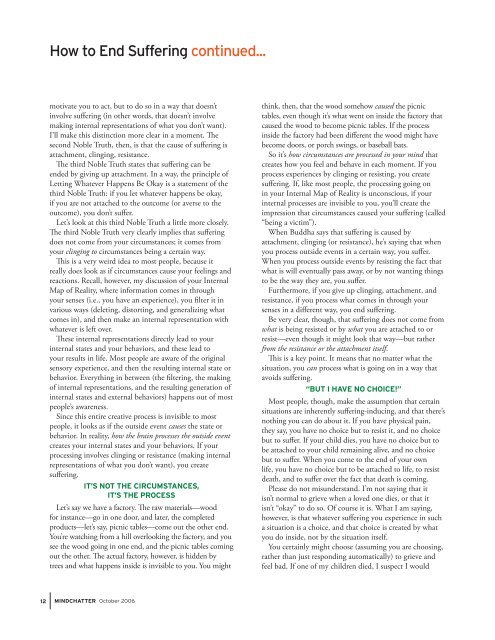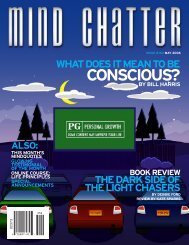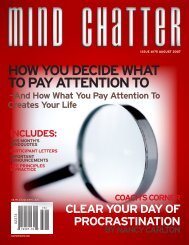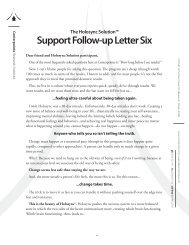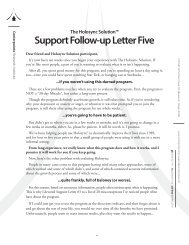Mind Chatter #165 (October, 2006) (PDF) - Centerpoint Research ...
Mind Chatter #165 (October, 2006) (PDF) - Centerpoint Research ...
Mind Chatter #165 (October, 2006) (PDF) - Centerpoint Research ...
You also want an ePaper? Increase the reach of your titles
YUMPU automatically turns print PDFs into web optimized ePapers that Google loves.
How to End Suffering continued...<br />
motivate you to act, but to do so in a way that doesn’t<br />
involve suffering (in other words, that doesn’t involve<br />
making internal representations of what you don’t want).<br />
I’ll make this distinction more clear in a moment. The<br />
second Noble Truth, then, is that the cause of suffering is<br />
attachment, clinging, resistance.<br />
The third Noble Truth states that suffering can be<br />
ended by giving up attachment. In a way, the principle of<br />
Letting Whatever Happens Be Okay is a statement of the<br />
third Noble Truth: if you let whatever happens be okay,<br />
if you are not attached to the outcome (or averse to the<br />
outcome), you don’t suffer.<br />
Let’s look at this third Noble Truth a little more closely.<br />
The third Noble Truth very clearly implies that suffering<br />
does not come from your circumstances; it comes from<br />
your clinging to circumstances being a certain way.<br />
This is a very weird idea to most people, because it<br />
really does look as if circumstances cause your feelings and<br />
reactions. Recall, however, my discussion of your Internal<br />
Map of Reality, where information comes in through<br />
your senses (i.e., you have an experience), you filter it in<br />
various ways (deleting, distorting, and generalizing what<br />
comes in), and then make an internal representation with<br />
whatever is left over.<br />
These internal representations directly lead to your<br />
internal states and your behaviors, and these lead to<br />
your results in life. Most people are aware of the original<br />
sensory experience, and then the resulting internal state or<br />
behavior. Everything in between (the filtering, the making<br />
of internal representations, and the resulting generation of<br />
internal states and external behaviors) happens out of most<br />
people’s awareness.<br />
Since this entire creative process is invisible to most<br />
people, it looks as if the outside event causes the state or<br />
behavior. In reality, how the brain processes the outside event<br />
creates your internal states and your behaviors. If your<br />
processing involves clinging or resistance (making internal<br />
representations of what you don’t want), you create<br />
suffering.<br />
IT’S NOT THE CIRCUMSTANCES,<br />
IT’S THE PROCESS<br />
Let’s say we have a factory. The raw materials—wood<br />
for instance—go in one door, and later, the completed<br />
products—let’s say, picnic tables—come out the other end.<br />
You’re watching from a hill overlooking the factory, and you<br />
see the wood going in one end, and the picnic tables coming<br />
out the other. The actual factory, however, is hidden by<br />
trees and what happens inside is invisible to you. You might<br />
think, then, that the wood somehow caused the picnic<br />
tables, even though it’s what went on inside the factory that<br />
caused the wood to become picnic tables. If the process<br />
inside the factory had been different the wood might have<br />
become doors, or porch swings, or baseball bats.<br />
So it’s how circumstances are processed in your mind that<br />
creates how you feel and behave in each moment. If you<br />
process experiences by clinging or resisting, you create<br />
suffering. If, like most people, the processing going on<br />
in your Internal Map of Reality is unconscious, if your<br />
internal processes are invisible to you, you’ll create the<br />
impression that circumstances caused your suffering (called<br />
“being a victim”).<br />
When Buddha says that suffering is caused by<br />
attachment, clinging (or resistance), he’s saying that when<br />
you process outside events in a certain way, you suffer.<br />
When you process outside events by resisting the fact that<br />
what is will eventually pass away, or by not wanting things<br />
to be the way they are, you suffer.<br />
Furthermore, if you give up clinging, attachment, and<br />
resistance, if you process what comes in through your<br />
senses in a different way, you end suffering.<br />
Be very clear, though, that suffering does not come from<br />
what is being resisted or by what you are attached to or<br />
resist—even though it might look that way—but rather<br />
from the resistance or the attachment itself.<br />
This is a key point. It means that no matter what the<br />
situation, you can process what is going on in a way that<br />
avoids suffering.<br />
“BUT I HAVE NO CHOICE!”<br />
Most people, though, make the assumption that certain<br />
situations are inherently suffering-inducing, and that there’s<br />
nothing you can do about it. If you have physical pain,<br />
they say, you have no choice but to resist it, and no choice<br />
but to suffer. If your child dies, you have no choice but to<br />
be attached to your child remaining alive, and no choice<br />
but to suffer. When you come to the end of your own<br />
life, you have no choice but to be attached to life, to resist<br />
death, and to suffer over the fact that death is coming.<br />
Please do not misunderstand. I’m not saying that it<br />
isn’t normal to grieve when a loved one dies, or that it<br />
isn’t “okay” to do so. Of course it is. What I am saying,<br />
however, is that whatever suffering you experience in such<br />
a situation is a choice, and that choice is created by what<br />
you do inside, not by the situation itself.<br />
You certainly might choose (assuming you are choosing,<br />
rather than just responding automatically) to grieve and<br />
feel bad. If one of my children died, I suspect I would<br />
12 MINDCHATTER <strong>October</strong> <strong>2006</strong>


